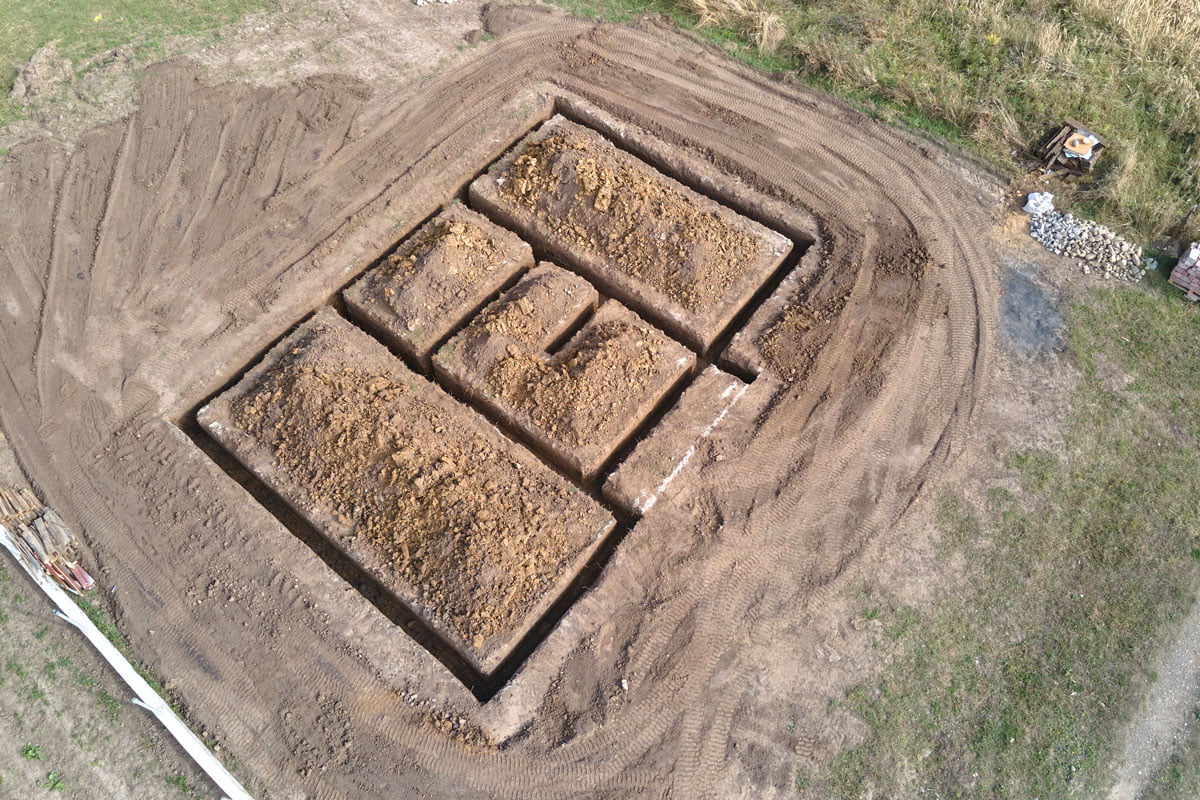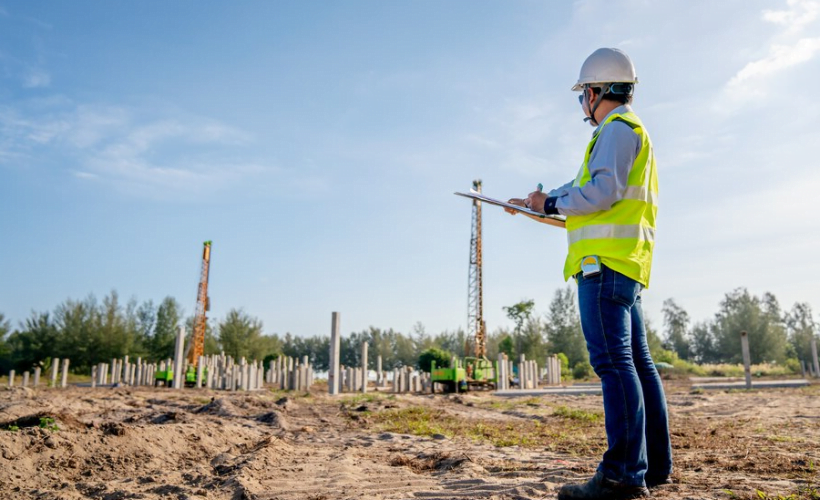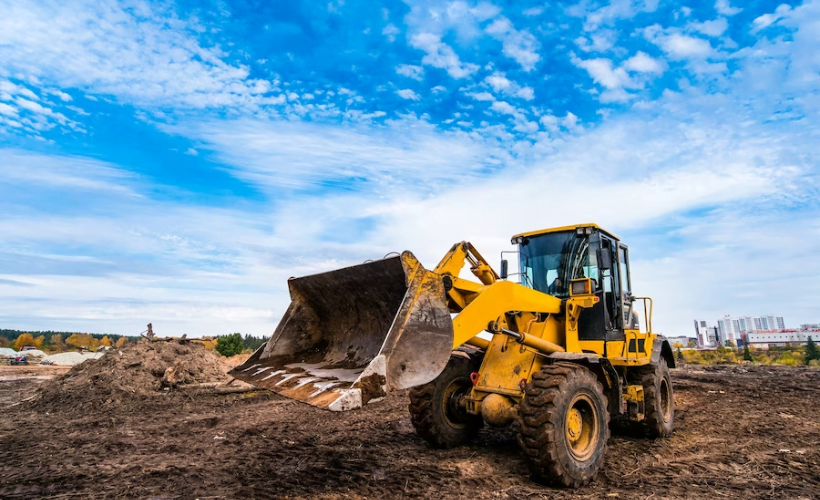Though you might think of teachers when considering grading, it happens on construction sites, too. However, that’s where all similarities end.
Most construction projects require some grading. It’s an essential step to optimize the land by creating a mixture of depressions, embankments, and flat areas. Let’s learn more about this type of work:
What Does Grading Mean in Construction?
In a sense, grading requires moving soil or fill from one area to another to achieve a particular elevation or scope. This ranges from compacted and level land (foundations) to sloped soil to prevent drainage issues.
Site workers and excavators often use heavy machinery like motor graders, excavators, scrapers, and dozers to dig up and redistribute the earth according to the grading plans. Then, more heavy equipment is used, such as rollers and compactors, which stabilize the soil.
Most grading contractors offer other services, including finished construction and erosion control, to ensure that your renovated or new building has a reliable infrastructure and a solid foundation.
Why Grading Is Important
Having a detailed grading plan helps you excavate a plot of land into one that suits your building. Here are a few reasons why grading projects are so crucial:
Proper Drainage:
Proper drainage on a site means that water is directed away from the structures and toward designated runoff areas or drains. A good grading strategy creates a path to encourage water to go where it’s supposed to be. This will reduce damage relating to floods and more.
Structural Integrity:
The ground under a structure should be stable and firm. Otherwise, it could introduce many problems that impact the building and infrastructure. Improper grading can lead to many issues, so it’s wise to work with an excavating contractor to grade the area, preventing soil erosion and structural damage.
Land Optimization:
Grading lets professionals make adjustments to the land’s profile to meet your housing development needs. This includes providing a solid base, improving erosion control, and more. Overall, the process of grading helps you make better use of the land.

Types of Grading
There are many types of construction grading to consider, which include:
- Rough Grading – Rough grading helps to set the level or slope of the area before the project begins. This is ideal for turf development and can resolve improper drainage issues. It’s done in the beginning to shape the land.
- Regrading – This means raising or lowering areas of the land, which is often done to prevent environmental issues, such as too much water in one area.
- Landscape Grading – This means altering the land’s area for irrigation systems and the basic shape of the land. Usually, it requires removing the topsoil, implementing a drainage system, modifying slopes, and smoothing out the soil.
- Architectural Grading – This grading type is done on properties before building new things. It involves changing the full contour of the landscape for better drainage and a solid base.
- Final Grade – For landscape projects, it’s often necessary to use a final grade. This involves putting on a top layer of soil to promote plant growth.
- Finish Grading – Typically, finish grading is only done for earthworks and gravel roads. It includes the cover and surface of a finished project. Likewise, you can do this for landscaping projects, where you get the best shape for the land before sodding, seeding, or planting.
The Process for Grading
What’s the grading process look like? How will it fit into the construction process altogether? The exact answers will vary based on what you’re doing, but these are the typical steps for most grading processes:
Site Evaluation and Planning:
Before any dirt is moved, landscape architects, civil engineers, and land surveyors will evaluate the site to create a detailed grading plan. These grading plans will be used to help with soil quality, drainage flow, and to make drainage patterns.
Clearing the Land:
Once a plan is in place, construction equipment is brought in. Usually, land clearing is the first step, which removes debris, vegetation, and existing structures.
Fill and Cut:
Cutting and filling are at the heart of the grading process. Cutting means removing soil from the surface, and the depth of cuts will depend on your needs. Likewise, fill means more soil added.
Soil Compaction:
After the land grading is complete, the professionals compact the soil. Pressure and weight are applied to create a stable ground that won’t settle or shift as much.
Finishing:
Once a level base is formed, the contractors will make any final adjustments to make sure the land meets project specifications and building codes.
Factors Affecting Grading in Construction
Here are a few variables that could influence the grading process:
Soil Type:
The soil composition you have makes a difference. Most soils feature silt, sand, clay, or a combination of them all (loam). Rock is also prevalent.
If the soil contains too much clay, it can hold onto moisture and expand, though it shrinks as it dries. Stabilization and reinforcements are often used to avoid chunks of soil falling away.
Scope and Size of Landscaping Projects
The scope and size of the project impact how the work team completes and approaches the project. For example, a large-scale project with many acres will require different things than parking lots.
Likewise, the topography and natural features can impact the grading process. Existing elevations, slopes, depressions, and hills might work with or against the site.
Environmental Impact:
There are also environmental considerations to ponder. The local ecosystem, climate, and adjacent properties can alter how the grading process works.
For example, areas with heavy rainfall will need appropriate drainage patterns and irrigation systems. If the location is protected, you may not be able to change the water flow.
Choosing the Right Grading Contractor – RGC
Proper grading in construction requires the right expertise, equipment, and precision. Overall, they are creating a level base for the new building and might be working around utility lines already on the commercial property.
RGC Excavation Services has many years of experience in grading and offers various services, including:
- Rough grading
- Finished grading
- Grading in construction
- Drainage systems
If you’re interested in starting a project, please contact us at 519-326-3959 to get it done correctly.



Share This Article
Choose Your Platform: Facebook Twitter Google Plus Linkedin